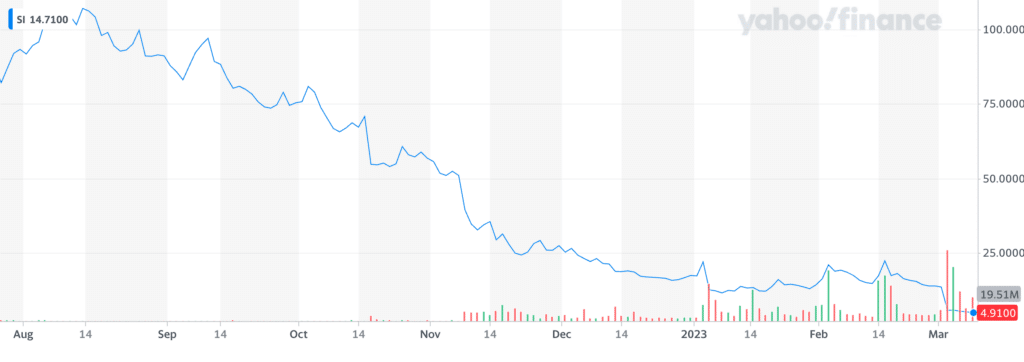Silvergate shares go down 43.8% in after-hours trading

Silvergate Capital shares have gone down 43.8% in after-hours trading. The company is in the process of liquidation and winding down its operations.
Silvergate had almost a billion-dollar loss when FTX, its primary customer, collapsed in late 2022. The exchange also had total deposits from digital asset customers go down from $11.9 billion to $3.8 billion in the fourth quarter.
Due to regulatory and business challenges, the company filed a notice to delay filing its annual report last week. Silvergate mentioned that these challenges affected its ability to remain a going concern for 12 months.
Following the notice, the stock took a deep dive, and on March 8 after-hours trading, it went down below $3.00. When writing, Silvergate shares (SI) have dropped 43.8% to $2.1.

Notably, many shorted SI nonstop, with just 10% of calls. According to Unusual Whales, despite this, two traders opened new heavy put positions today and yesterday in SI $2 and SI $4 strike expiring in nine days. In addition, they are likely to make 500% tomorrow.
Jeff Dorman, on Twitter, mentioned that the SI equity is going to $0 while the tokens of dApps and protocols maintain their value.
Silvergate’s liquidation is ongoing
Silvergate made sales in more debt securities in January and February. In the coming days, more losses might come to the securities portfolio. These will impact the firm’s regulatory capital ratios and hence could lead to less than well-capitalized.
Meanwhile, the company said it would stop its operations and liquidate the bank. They added that they believed that the decision was the best way forward.
Silvergate has had a troublesome few months. The company laid off 40% of its staff in January after losses of nearly $1 billion in the fourth quarter. Furthermore, customer deposits fell 68% to 3.8 million as the year ended. The company had to sell $5.2 billion of debt securities to cover withdrawals. In addition, it went to the Federal Home Loan Bank for $4.3 billion.
The Silvergate series of events leading to the liquidation has raised several questions on U.S. banks and whether they should keep off digital assets and minimize crypto firms’ access.

















